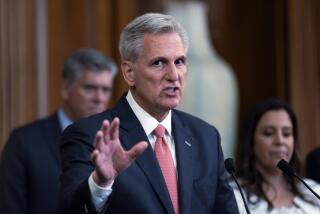Dispute Hurts Chances for Quick Passage of Farm Bill
- Share via
WASHINGTON — Chances for final action this week on a new farm bill plunged Wednesday as House and Senate conferees became mired in deep disagreement over the crucial issue of income supports for farmers.
The conferees spent most of the day dodging final decisions on less controversial sections of the bill, then went into gridlock on the amount of income “safety net” that the measure should provide.
Senate Majority Leader Robert J. Dole (R-Kan.), attempting to force the issue with a new compromise proposal, renewed warnings that the conferees’ inaction threatened chances for producing a bill this year.
Dole indicated that he might keep the Senate in session next week by delaying other key legislation while farm-bill conferees continued working. “What we from farm states are fearful of is that we won’t find a quorum around here next week to vote on a farm bill,” he said.
Dole’s compromise, more generous than what the Administration has said it would accept, was rejected by House Democrats and Republicans, leaving the two sides at wide odds and dashing the possibility of a quick settlement.
“When we make a proposal that says a two-year freeze is what will save a veto, it is sort of like playing chicken. It is philosophy, or perception, not cost, that would cause a veto,” said Sen. John Melcher (D-Mont.).
“On this, the Administration cannot win, and it doesn’t deserve to win. Whether we have a safety net there for farmers is for Congress to decide. I just don’t understand that the Administration has not learned over the last 11 months that that is the issue,” he said.
The split between the White House and farm-state legislators over deficiency payments--direct subsidies to those who farm wheat, corn, rice and cotton--has persisted throughout the year-long debate on farm policy.
The Administration wants a one-year freeze of the payments, with modest reductions in later years, to reduce budget costs and dissuade farmers from overproduction. The Senate adopted a two-year freeze and the House a five-year freeze.
Although the Administration says a four-year freeze would cost $12 billion more than a one-year freeze, Farm Belt lawmakers have insisted on maintaining higher income supports to compensate for lower market prices mandated by both bills.
Dole’s new proposal calls for a two-year freeze on payments to wheat and corn farmers, with later cuts to be cushioned by giving farmers surplus commodities. No House conferee supported the offer.
A House counteroffer by Thomas S. Foley (D-Wash.)--a four-year freeze with part of the payments in commodities--was rejected by Republican-led Senate conferees, 5 to 4, on a party-line vote. Melcher then offered a three-year freeze, which the Senate again rejected, 5-4.
Rep. Thomas J. (Jerry) Huckaby (D-La.) then proposed a variation on the Dole offer, a two-year freeze with partial payment in commodities in later years, but the Senate voted that down by the same margin.
The impasse over income supports was only one of a number of issues the conferees could not settle. Others included:
- Whether to bar the secretary of agriculture from terminating a marketing order without giving advance notice to Congress. The controversial orders allow farmers to regulate the flow of specialty crops to market.
- Whether to order the Administration to reduce quotas on imported sugar as a means of reducing the cost of the domestic sugar-support program. The Administration opposes such a move.
- How to deal with cargo preference, which pits maritime interests against those of agriculture over how much government-sponsored grain exports should be required to move on U.S. flag vessels.
More to Read
Get the L.A. Times Politics newsletter
Deeply reported insights into legislation, politics and policy from Sacramento, Washington and beyond. In your inbox twice per week.
You may occasionally receive promotional content from the Los Angeles Times.










